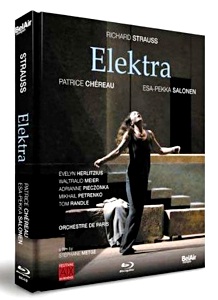Richard Strauss’ Elektra has always been something of a touchstone opera for this reviewer. It was one of the first operas I attended at the Met (Birgit Nilsson’s return in 1980—I still have her “Orest!” ringing somewhere in my brain). It was the first full opera recording I ever bought (Nilsson, Solti) on cassettes that I still have in my collection. My other live Elektras include Ute Vinzing, Hildegard Behrens and, most recently, the excellent Christine Goerke in Chicago.
But none of my previous Elektra experiences prepared me for this stunning, overwhelming performance from the Festival d’Aix-en-Provence, with brilliant and incisive stage direction by Patrice Chéreau (his final opera staging before his death in 2013). Esa-Pekka Salonen leads a superb cast and the Orchestre de Paris in a reading of Strauss’ score that doesn’t stint on the powerful climaxes yet brings out all the musical textures—there are, of course, the booming brass-and-drums moments, but Salonen also finds the thrilling quiet moments. The playing and singing in the Recognition scene are exquisitely sweet.
Soprano Evelyn Herlitzius is vocally and dramatically ideal for the title role, pouring out torrents of sound that easily soar over the orchestra in climactic moments yet she finds subtle shadings and caresses the vocal line throughout the long and harrowing role, all cannons blazing from every ship in her vocal flotilla. Herlitzius embodies a wide range of emotion and passion, and is the most human Elektra of my experience.
From the first “Allein!” of her opening monologue, she infuses the singing with a palpable longing and a desperate need to invoke the ghost of her father. With her lithe, dancer’s body and her deeply expressive eyes, Herlitzius is also a physically persuasive Elektra with the stamina to top off the performance with a crazed, twitching dance that shows us that this Elektra is not dancing in triumph but is realizing that, with the murders of her mother and Aegisth, her own purpose in life is gone. With this performance, Herlitzius lays claim to the mantle of being the finest Elektra of her generation.
The supporting cast moves from strength to strength. Adrianne Pieczonka provides a warm, lush soprano as Chrysothemis, and her urgent desire to marry and have children is a moving contrast to Elektra’s single-minded desire for vengeance.
But it is in the great confrontation between Klytämnestra and her daughter Elektra that Chereau makes his most fascinating directorial choices. When Waltraud Meier flings out the door to find Elektra, she is nothing of the usual insomnia-crazed harridan so often depicted. She is instead a handsome woman, elegantly dressed, who sings with a quiet, very human intensity. Haunted for years by dreams that have made her life a misery, this Klytamenestra still is unable to express guilt, or even to speak one word about the murder of Agamemnon.
What follows is a mother-daughter scene still fierce, but at times almost unbearably tender. Meier sings and acts the role beautifully, and Chéreau creates a stunning stage picture where mother and daughter are seated next to each other, but with their backs turned as if they cannot bear to look at one another. When the moment arrives when Elektra identifies her mother as the needed sacrificial victim, the shock on Meier’s face is priceless. The scene ends with Klytamenestra learning of Orest’s death by letter, and we are spared the usual cackling laughter from her. Some may find this scene underplayed, but I found it riveting. Chéreau has directed a scene between a mother and daughter whose relationship is permanently broken. It works much better than the usual Grand Guignol hysterics.
Mikhail Petrenko is a hulking, unusually dark presence as Orest, carrying out the murders with icy precision. Chereau has again avoided a cliché is his portrayal of Aegisth. Tom Randle plays the role as a nattily dressed dandy, not the babbling drunkard so often seen. And what a pleasure it is to see that Chéreau has cast some of his veteran, long-term collaborators in smaller roles: Donald McIntyre (Wotan in Chéreau’s iconic Bayreuth Ring Cycle) as an old servant; 89 year old Franz Mazura as Orest’s guardian; and soprano Roberta Alexander, who sings the Fifth Maid and defends Elektra with vocal warmth and clarity that make her a standout. Veteran Renate Behle is also on hand as the strict and caustic Overseer of the Maids.The production is stark and minimal. Richard Peduzzi’s set contains high walls that make the courtyard seem very claustrophobic, though there are numerous gates and doors and trap doors. We seem to be outside the McMansion of a member of the “1%”—only Klytamenestra and Aegisth are elegantly dressed, all the maids, Chrysothemis, and the actors who play servants are dressed in simple, modern, quite unfashionable clothes by designer Caroline de Vivaise.
Chéreau has employed six extra actors in addition to the Maids, and they serve to help create the impression of a household that feels more like a prison. There are people lurking in doorways throughout the opera, overhearing things they should not. Even in Elektra’s opening “Allein!” monologue, she is not completely alone; the Fifth Maid hears the beginning of the monologue, and Chrysothemis emerges to hear the end of it. The effect is chilling.
Many of Chéreau’s directorial touches are gathered near the end of the opera, and, though many of them contradict stage directions in the libretto, there is intelligence and imagination at work here, and the performance is better for it. When Orest kills his mother, there are two blood-curdling screams from within the house, but here, Orest drags her out to the courtyard to finish her off. Klytamenestra’s body remains in a dark area of the platform through the end of the opera.
As Aegisth demands more light, Elektra moves her taper to illuminate her mother’s body. As Aegisth runs to her in horror, Orest hands his dagger to his Guardian (Mazura), who stabs Aegisth from behind. Thus, when Aegisth desperately asks, “Does no one hear me?” Elektra is directly above him to shriek to his distorted face, “Agamemnon hort dich!,” one of the most powerful moments in the libretto.
But Chéreau’s most brilliant moment is the very end of the opera. After her frenzied dance, Elektra simply sits on her perch and stares into the audience. Orest then walks out the gate, despite Chrysothemis’ efforts to stop him. Elektra does not slump to the floor, dying. She stares blankly out, her eyes glazed, completely catatonic. Chereau leaves us with the image of Elektra’s unblinking, dead eyes. It is an overwhelming conclusion to this triumphant production.
Mention must be made of the excellent film direction of Stephane Metge, a tasteful and well-focused version for this DVD. Even the curtain calls on the DVD are exciting, the audience wildly applauding the artists and then Chéreau himself, beaming with joy at the audience’s reception of what was to be his last staging of opera.
I’ve already watched this DVD three times, and I’m still finding new revelatory moments in the performance. I’m going to give the old cliché: Run, do not walk, to get this handsomely packaged DVD.




